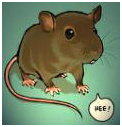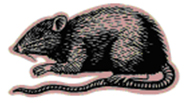Rat Poison
RULES;
 You must not use, or allow to be used, any rat poison on your allotment. This rule has been introduced to prevent the accidental poisoning of children, dogs and other non-target animal on the Allotmentand the association then becoming liable under COSHH (Control of Substances Hazardous to Health) regulations.
You must not use, or allow to be used, any rat poison on your allotment. This rule has been introduced to prevent the accidental poisoning of children, dogs and other non-target animal on the Allotmentand the association then becoming liable under COSHH (Control of Substances Hazardous to Health) regulations.
If you see rats, let the Committee know. Please see the hints below about how to discourage rats.
How can I prevent an infestation?
Discouraging rats at the allotment site is everybody’s responsibility. help prevent them making your plot their home.
Turn the contents of your compost bin regularly (at least twice per year). This not only disturbs any rats that have taken up residence but also aerates your compost heap which speeds up the process of digestion and reduces the amount of methane (a greenhouse gas) your heap emits. Have a shovel ready to hit any escaping rats over the head as you do it.
Plastic compost bins should be given a small gauge wire mesh lining at the base or can be placed on paving slabs to prevent rats from burrowing in underneath.
Regularly kick your compost bin to ensure it is not a peaceful place for rats to sleep and check they are not taking up residence in your greenhouse.
Never put meat, dairy, bones, cooked foods or other inappropriate items in your compost bin. This will attract rats and make your bin smell.
Harvest ripe fruit and vegetables promptly and take them home to enjoy. Rats particularly enjoy sweetcorn cobs, as many of us know to our cost. Do not put unwanted cobs on the heap, take them home to the wheely bin.
Do not leave discarded fruit and vegetables on the ground; clear them away to your compost bin, as these are a source of food for rats and other pests.
Do not feed wild birds or other animals to excess – you may be feeding rats as well.
If you keep chickens on the Allotment, have a good housekeeping system, clear up food spillages, keep chicken food in rat proof containers and prepare to be blamed (unfairly) for all the rat problems for miles around!
Ensure that your allotment does not become overgrown or allow rubbish to build up e.g. timber, stockpiled materials etc, as this provides cover for rats to live under.
Remember to thoroughly wash (and peel if appropriate) any food you harvest. Vegetables with signs of rat damage should be destroyed. Rats carry risk of Weil’s disease, Salmonella and Leptospirosis among other things and they urinate wherever they go! It is good practice to wear gloves when handling compost and soil.
Please report specific problems with rats to members of the allotment society committee.